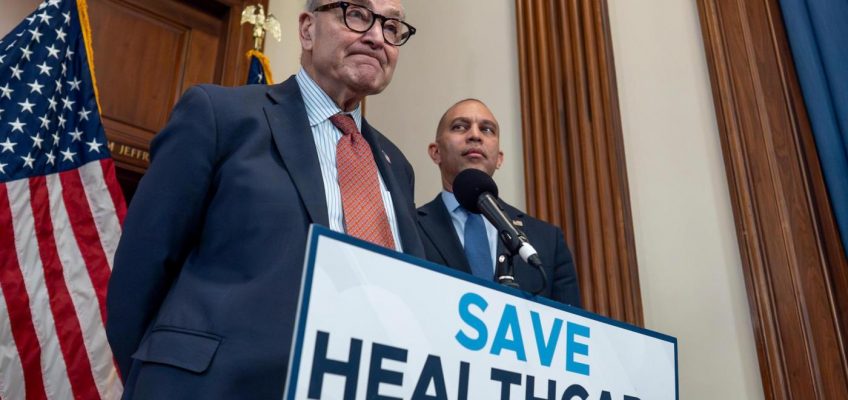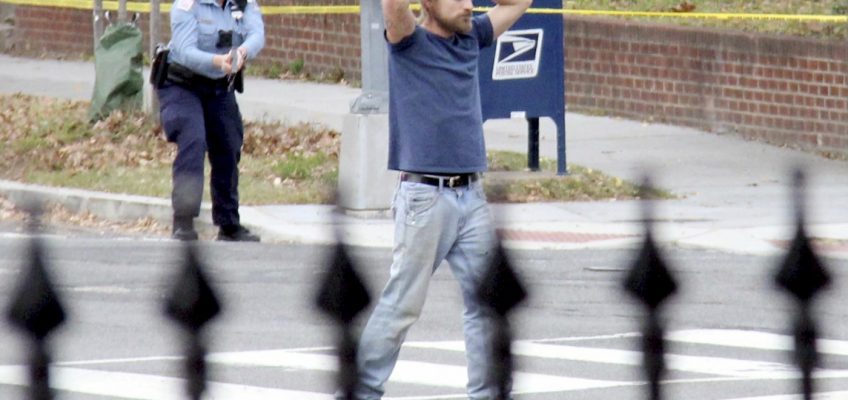By ALI SWENSON, LINLEY SANDERS and AMELIA THOMSON-DEVEAUX, Associated Press
WASHINGTON — Fifty-two-year-old Dinam Bigny sank into debt and had to get a roommate this year, in part because of health insurance premiums that cost him nearly $900 per month.
Next year, those monthly fees will rise by $200 — a significant enough increase that the program manager in Aldie, Virginia, has resigned himself to finding cheaper coverage.
“I won’t be able to pay it, because I really drained out any savings that I have right now,” he said. “Emergency fund is still draining out — that’s the scary part.”
Bigny is among the many Americans dependent on Affordable Care Act marketplace health insurance plans who are already struggling with the high cost of health care, according to a new survey from the health care research nonprofit KFF.
Most of the more than 1,300 enrollees surveyed in early November say they anticipate that their health costs will be impacted next year if Congress doesn’t extend expiring COVID-era tax credits that help more than 90% of enrollees pay for health insurance premiums, per KFF. The possibility of an extension looks increasingly unlikely.
The enhanced premium tax credits set to expire at the end of this year have been at the center of recent tensions in Congress, with Democrats calling for a straight extension and several Republican lawmakers vehemently opposed to the idea. Their inability to agree on a path forward fueled a record 43-day government shutdown earlier this fall.
President Donald Trump and some Republicans in Congress have circulated proposals in recent weeks to offer a short-term extension or reform the Affordable Care Act, but no plan has emerged as a clear winner. Meanwhile, the window for Americans to shop for next year’s plans is well underway with less than a month to go until the subsidies expire.
KFF’s poll reveals that marketplace enrollees — most of whom say they would be directly impacted by the subsidies expiring — overwhelmingly support an extension. The survey found this group is more likely to blame Trump and Republicans in Congress than Democrats if the tax credits are left to expire.
Enrollees already find it challenging to afford health expenses
The expiration of the tax credits — which a separate KFF analysis found will more than double monthly payments for the average subsidized enrollee — comes as Americans are already overwhelmed by high health expenses, the poll shows.
About 6 in 10 Affordable Care Act enrollees find it “somewhat” or “very” difficult to afford out-of-pocket costs for medical care, such as deductibles and copays. That exceeds the roughly half of enrollees who find it challenging to afford health insurance premiums. Most also say they could not afford a $300 per year increase in their health insurance costs without significantly disrupting their household finances.
Cynthia Cox, a vice president of KFF who leads the organization’s ACA research, said the population of Americans on Affordable Care Act health insurance includes some high-earning entrepreneurs and small business owners, but the bulk of enrollees are lower-income and therefore vulnerable to even small increases in health costs.
“These are often going to be people who are living paycheck to paycheck, who have volatile or unpredictable incomes as well,” she said. “Increases that many of them are facing are going to be some sort of financial hardship for them.”
Most enrollees see cost increases on the horizon
Slightly more than half of Affordable Care Act marketplace enrollees believe their health insurance costs will increase “a lot more than usual” next year, according to the poll. About another 4 in 10 anticipate increases that will be “a little more than usual” or “about the same as usual.”
Larry Griffin, a 56-year-old investment banker and financial adviser in Paso Robles, California, already pays $920 a month for his gold-level health plan through the state’s insurance marketplace. He says that price will go up to about $1,400 a month next year — alongside jumps in copays and his annual out-of-pocket maximum.
He’s concerned the increases will affect his ability to save money for his upcoming retirement, but with the recent amputation of his left leg below the knee, as well as other health issues, he said he can’t risk going off health insurance or downgrading his plan.
Griffin is among the roughly three-quarters of marketplace enrollees who say health insurance is “very important” for their ability to access the health care they need.
“I’m not going to say that I can’t manage it, I can, but it’s just another one of those things,” he said. “Here’s, you know, knock number 5,000 against me after all of the other things I’ve had to deal with.”
Patricia Roberts, 52, a full-time caregiver for her daughter in Auburn, Alabama, expects her monthly health insurance premiums to rise from around $800 a month to $1,100 a month next year — costs she can manage. But her friends across the border in Georgia are staring down doubling monthly fees next year.
“I don’t know how people are going to live, with it already being a struggle just to pay for food and all the other things,” Roberts said.
Support for an extension stretches across political parties
The poll shows allowing the enhanced tax credits to expire would be overwhelmingly unpopular with current marketplace enrollees.
Support for continuing the tax credits extends across party lines. Nearly all Democrats and about 8 in 10 independents who are enrolled in marketplace plans say the credits should be extended, as do about 7 in 10 Republicans. Support is similarly high among Republicans and Republican-leaning independents who support the MAGA movement, and those who don’t.
Yvette Laugier, 56, a Republican in Chicago, said while her income is too high to qualify her for the enhanced premium tax credits, she supports extending them temporarily with additional fraud protections to give lower-income enrollees more time to consider their options.
Among those who think Congress should extend the credits, about 4 in 10 say Trump would deserve “most of the blame” if they were allowed to expire and roughly one-third say that about Republicans in Congress. Democrats in Congress are much less likely to receive blame: only 23% of enrollees say they would deserve the bulk of responsibility.
Bigny, in Virginia, said the blame should be split between both Democrats and Republicans. But he has hope they can come to a compromise and potentially a temporary extension in the coming weeks.
“They should just sit and really look for what’s best for American people overall,” he said.
Swenson reported from New York.
Related Articles
Trump hosting the leaders of Congo and Rwanda to sign key deal for peace in eastern Congo
Putin says there are points he can’t agree to in the US proposal to end Russia’s war against Ukraine
Trump is fighting the Institute of Peace in court. Now, his name is on the building
Nvidia CEO Jensen Huang visits Republicans as debate over intensifying AI race rages
US opens massive $796M consulate in Irbil to strengthen Kurdish ties




